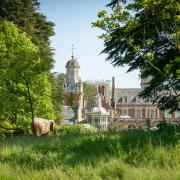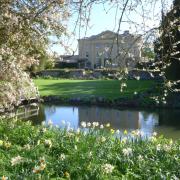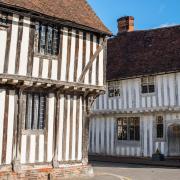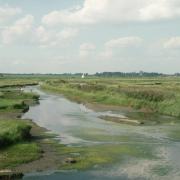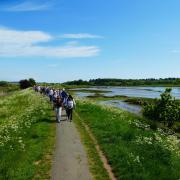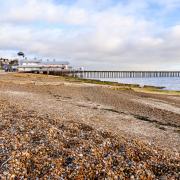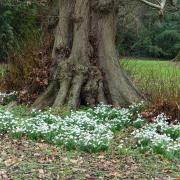Clare Slater loves words, and she loves what words can do – tell stories, reveal something about us as people and as a society. And for the new artistic director of HighTide, the best place to tell stories is on stage.
HighTide is a writer-centred theatre company that has been part of the Suffolk cultural landscape since 2007 when it staged its first performances at The Cut in Halesworth. Under the guidance of founding artistic director Steven Atkinson, it provided an ever-expanding festival experience in the town until 2015, when the summer showcase moved to the beach in Aldeburgh.
Housed in a series of linked ship containers and a large marquee, the event took over the town for 10 days, hoisting HighTide flags on lamp-posts, staging plays, readings and celebrity interviews on the beach, in the Jubilee Hall, the church hall, Aldeburgh Cinema and The Pump House.
In 2019 Suba Das took up the reins and relocated the event to the New Wolsey Theatre in Ipswich. Then Covid struck and the world was locked down.
Now, Clare Slater, fresh from the agenda-setting world of The Donmar Warehouse, has arrived to take HighTide to the next level. Clare arrived earlier this year with an ambition to make the East of England a theatrical powerhouse – Britain’s leading producer of new theatre, with a steady flow of perceptive and entertaining work. She describes the work of HighTide as ‘celebrating the joy and the power of new writing – new theatre’.
Her vision aims to inspire and support writers across the region to create work which reflects not just life in modern Britain, but life in the east also. To facilitate this, she is firmly rooting HighTide in Suffolk. For many years HighTide has had an almost schizophrenic relationship with the county – a strong presence here in the summer, but retreating to London during the winter months.
Many of its writers’ workshops and development work used to take place in London, but Clare is determined that everything will happen in Suffolk now. HighTide's offices are to be found at the New Wolsey’s NW2 building in Ipswich and it will be using facilities like Wingfield Barns, which are intimate and adaptable.
This means writers can try out first drafts of scripts in front of small audiences, stage rehearsed readings, seek feedback, and have open and honest conversations about what works and what doesn't in a supportive environment that encourages discussion and allows work to be improved before a full-scale performance.

Clare's 2030 Vision for HighTide is to become part of an integrated literary, theatrical landscape, reaching out to Suffolk’s diverse cultural communities, and inspiring people, young and old, to pick up a pen (or hammer a keyboard) to create something that reflects them and their experiences of the world. 'It’s all about increasing confidence, wellbeing and, indeed, employability as people find ways of putting their thoughts and feelings into words.'
For Clare theatre has always had the power to inspire and reveal the best in people. She sees it as a window into society; how some interests change over time and other concerns are timeless.
'What took me into theatre was that I had an older brother who knew from an early age that he wanted to be an actor, so theatre has always been in our lives, even as children, and I followed him around like a shadow. I think another reason is the intoxication you feel when you are exposed to theatre at a young age and you want to keep replicating that feeling.'
Panto was another important introduction into the world of theatre. She grew up in Northampton, where her parents took the family to The Royal and Derngate Theatre for their annual dose of Christmas fun. 'It was my first experience of theatre – I just fell in love with the atmosphere of it all.'
This love of live performance was increased when she found herself involved in school plays. But, unlike her brother who always wanted to perform, it was the toil and bustle of backstage life that caught her imagination.
'I realised very early on was that I was not an actor. I couldn’t imagine anything more terrifying – still can’t. I also didn’t think I would be any good as a director.' These, it seemed, were the only jobs in the theatre. 'So I spent many years knowing I wanted to work in the theatre but having no clue as to how or where.' Clare’s first step into the world of writing for theatre was creating plays for her school friends to appear in, an activity supported by her teachers.
'That’s when my real love of theatre developed. But it wasn’t until I left university and went to do an internship at the Goodman Theatre in Chicago that I realised that there were other avenues available. For a while I thought I could work in casting until it became apparent that I am really bad at remembering names and faces.'

Clare discovered, during what she describes as an idyllic summer in Chicago, that theatre also offered jobs as a dramaturg and in literary management. Both embraced her love of writers and using the written word to create magic on stage. She left America, came back to the UK, and got a job with an actors' agency as an admin assistant – and began bombarding London’s theatres and literary agencies with letters seeking meetings and advice on how to get into this hidden part of theatre life.
'I am happy to report that the vast majority of people replied – from the National Theatre to The Bush. Loads of wonderful people met me for coffee and gave me their advice about how to gain a foothold in this crazy profession. That’s one of the great things about our industry, it is wonderfully supportive and people take time to nurture the next generation.' As a result of all that advice, she started script-reading, first for small theatres then large theatres.
'I was lucky to get a job at the National (Theatre) in fundraising. It was great being close to the beating heart of a producing house. The feeling is thrilling. I was all of 22 and spent the next three years working in the individual giving department, and I can honestly say it is the most useful thing I have ever done.
'It was great fun and you learn about how to make theatre happen. You learn about what audiences and funders are looking for, and about the nature of programming and the rhythms of a season.'
Three years later, still script-reading in her spare time, she applied for the vacant position of assistant literary manager. Her passion and history of script-reading was rewarded when she landed the job.
'It was everything I ever wanted, my dream job, but it was also very scary because I was still only in my mid-20s and I found myself in high level development meetings with Nick Hytner, who was the artistic director at the time.
'My job was to find the writers of tomorrow, to identify those coming up through the ranks, those people the National should be aware of and allow ourselves to play the long game and nurture those writers we may commission in 10 years’ time.'
After three years, Clare felt ready for a new challenge, getting more involved with staging plays by new writers. She moved to The Gate Theatre in Notting Hill as executive director and learnt a lot about running a theatre. In 2016, another irresistible job presented itself and Clare moved to The Donmar Warehouse where she developed the role of literary manager, as the theatre's creative team focused more on new commissions.
'Latterly, I was their head of new work. It was a gorgeous job – much more high profile – working with senior directors and the leading playwrights, learning how to get a play commissioned from just a germ of an idea. I was involved throughout the development, getting it into rehearsals and on stage.'
It was the perfect training for something like HighTide, which is all about promoting and nurturing fledgling talent. Now, for the first time, Clare has space and time to put her years of experience into practice. Based in Suffolk, HighTide will shine a spotlight on our creative talent, allow it to flourish, and provide a wealth of entertaining and thoughtful new plays for theatres across the country.
Coming up...
Clare has hit the ground running. In the summer she worked alongside independent producer Karen Goddard on a series of rehearsed readings, at Wingfield Barns, of new work from emerging writers. This autumn, HighTide is staging a countywide tour of ghost stories in a range of atmospheric and historic venues across the eastern region, including pubs and museums.
Lit by candlelight, the evening will be a combination of chilling, contemporary tales and haunting new folk music. Ghost Stories by Candlelight is written by East Anglian playwrights Kelly Jones, Shamser Sinha and Nicola Werenowska. Music and songs are composed by local folk musician Georgia Shackleton and directed by Elayce Ismail. (It is recommended that audiences be aged 14 years and older.)
Produced in association with Shakespeare’s Globe, Theatre Royal Bury St Edmunds and Harlow Playhouse, HighTide will be on tour across East Anglia from October 13 to November 12, and then transfer to the Sam Wanamaker Playhouse at The Globe, London from November 23-25.
More details and booking at hightide.org.uk






